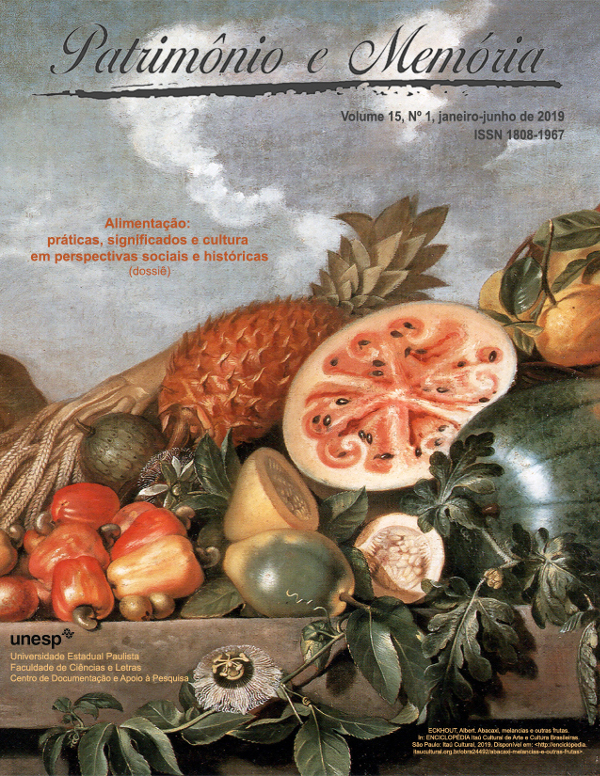The Iabás Fair in Madureira / Rio de Janeiro
food, music and afro-brazilian culture
DOI:
https://doi.org/10.5016/pem.v15i1.3244Keywords:
Festival, Food, Music, Heritage, Afro-brazilian cultureAbstract
During the decade of 2010 the Brazilian government, through the Institute of National Historical and Artistic Heritage (IPHAN), returns to the safeguarding of cultural assets that make up the so-called intangible heritage. Goods like the craft of the “baianas do
acarajé” and the “samba of the Recôncavo Baiano” are listed and in this context of appreciation and preservation of intangible heritage, cultural manifestations are created, preserved or recreated. In 2008, the Iabás Fair, an event focused on food and music, was created in Madureira / Rio de Janeiro. The recognition of the festival as intangible cultural heritage values the practices of underrepresented groups in Brazilian society. Howerer, there is no guarantee of the festival’s continuity, as this relies on leaderships of local associations.At the fair, food and music are shared, serving as links that keep Afro-Brazilians united in networks of solidarity and reciprocity whilst becoming a form of expression and consolidation of Afro-Brazilian ethnicity.
References
BERNARDO, T. O candomblé e o poder feminino. Rever, São Paulo, v. 2, n. 5, p. 1-21, 2005.
CACCIATORE, O. G. Dicionário de cultos afro-brasileiros. Rio de Janeiro: Forense Universitária, 1988.
ELIAS, R. Preferência nacional. Nossa História, Rio de Janeiro, n. 4, p. 34-37, 2004.
GONÇALVES, M. A. R. O candomblé e o lúdico. Rio de Janeiro: Quartet. 2007.
______ . A Vila Olímpica da Verde e Rosa. Rio de Janeiro: Editora FGV, 2003.
______ ; RIBEIRO, A. P. A. Mais que feijoada e samba: notas sobre a cultura negra brasileira. In: LEITÃO, Débora Krische; LIMA, Diana Nogueira de Oliveira; PINHEIRO MACHADO, Rosana (Org.). Antropologia & consumo: diálogos entre Brasil e Argentina. Porto Alegre: Age, 2006, p. 47-64.
HALL, S. A identidade cultural na pós-modernidade. Rio de Janeiro: DP&A, 2006.
LANDES, R. Cidade das mulheres. Rio de Janeiro: Editora da UFRJ, 2002.
MAUSS, M. O ensaio sobre a dádiva. In: Antropologia e Sociologia. São Paulo: EPU, 1974. v. 2.
MINTZ. S.; PRICE, R. O nascimento da cultura afro-americana: uma perspectiva antropológica. Rio de Janeiro: Pallas. 2003.
PRANDI, R. Contos e lendas afro-brasileiras: a criação do mundo. São Paulo: Companhia das Letras, 2007.
______ . Ifá: o Adivinho – histórias dos deuses africanos que vieram para o Brasil com os escravos. São Paulo: Companhia das Letrinhas, 2002.
______ . Mitologia dos orixás. São Paulo: Companhia das Letras, 2002.
RIBEIRO, A. P. A; CID, G.; VARGUES, G. (Org.). Memórias, territórios, identidades: diálogos entre gerações na Região da Grande Madureira. Rio de Janeiro: Mórula, 2019.
SLENES. R. W. Malungu, Ngoma vem! África encoberta e descoberta no Brasil. Luanda: Ministério da Cultura, 1995.
______ . Na senzala, uma flor: esperanças e recordações da família escrava. São Paulo: Editora da UNICAMP, 2011.
SILVA, V. S. da. A roda das donas: a mulher negra no candomblé. Rio de Janeiro, 2010. 122f. Dissertação (Mestrado em Educação) – Faculdade de Educação, Universidade do Estado do Rio de Janeiro.
VERGER. P. A contribuição especial das mulheres ao candomblé do Brasil. In: Culturas africanas. São Luis, MA: UNESCO, 1986.
Downloads
Published
How to Cite
Issue
Section
License
Copyright (c) 2019 Patrimônio e Memória

This work is licensed under a Creative Commons Attribution 4.0 International License.
All the content of the journal, except where noted, is licensed under a Creative Commons BY attribution license.


